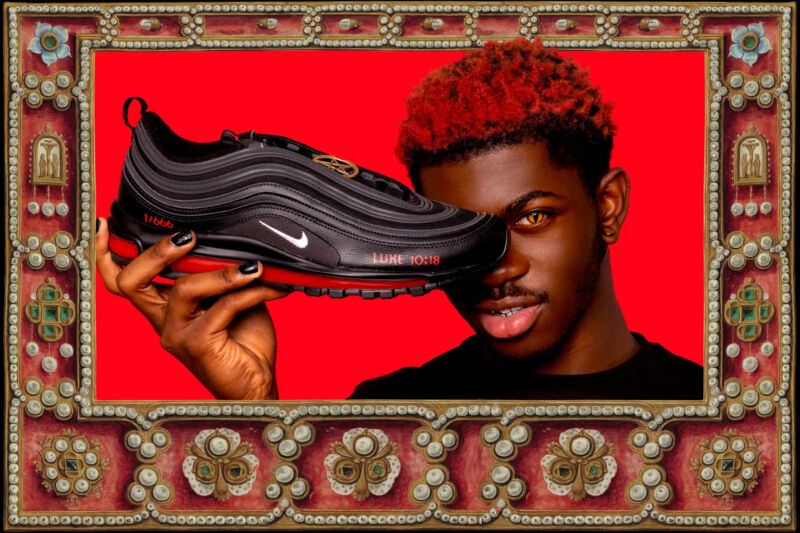
reader comments
131 with 77 posters participating
Nike is suing the company behind a viral, limited-edition custom shoe, arguing that the unauthorized custom work dilutes its brand and creates a false impression that Nike approves the controversial design.
The Satan Shoe, a collaboration between a company called MSCHF and rapper Lil Nas X, is a tie-in to the rapper’s new single, “Montero (Call Me By Your Name),” released last Friday. The music video for the song (contains explicit language and extremely unambiguous sexual imagery; do not watch at work or around small children) tells a story “of sin, banishment, and redemption” that ends with Lil Nas X descending into Hell, giving Satan the lap dance of a lifetime, then deposing him and claiming the devil’s horns for his own.
“Montero” proved to be an immediate viral sensation; in five days, it has racked up about 45 million YouTube views, and the song, the singer, and various related terms (“Satan,” “mark of the beast,” “devil,” etc.) have been trending on Twitter and other platforms nonstop for days.
The Satan Shoes differ from the original Nike Air Max 97 shoe due to the addition of a bronze pentagram on the laces, the number “666” and the phrase “Luke 10:18” embroidered on the side, “Lil Nas X” embroidered on the back, a red inverted cross on the top of the tongue, and a mixture of 60 cc of red ink and one drop of human blood injected into the bubble of the sole. MSCHF made only 666 pairs of the shoes, which (despite costing $1,018 each) sold out in minutes.
Nike argues in its suit (PDF) that it had nothing to do with these shoes, but MSCHF has created brand confusion leading customers to think Nike is somehow involved. “Nike files this lawsuit to maintain control of its brand, to protect its intellectual property, and to clear the confusion and dilution in the marketplace by setting the record straight,” the suit reads. “Nike has not and does not approve or authorize MSCHF’s customized Satan Shoes.” The company asks the court to stop MSCHF from fulfilling any orders for the shoes.
individual sellers slinging custom Nikes, as well as any number of websites specializing in them.
US law, broadly speaking, tends to be pretty forgiving of doing whatever the hell you want with a thing after you have legally purchased that thing. In intellectual property law, there’s a legal principle called the first-sale doctrine. At a high level, the first-sale doctrine basically means that someone loses their intellectual property rights over what is done with a thing they have sold at the time they sell it and that the new owner then gets to decide what to do with it. There are, of course, exceptions, but generally if I spend my own money legally to acquire something—a book, a shoe, a designer bag—I can modify it however I want and then sell it to whomever I want for whatever price that person is willing to pay. There is a similar principle, called patent exhaustion, that applies to goods that are patented rather than copyrighted.
Nike, however, is specifically alleging brand confusion and trademark infringement. In short, the company says its swoop (sorry, “SWOOP”) is world-famous, and by leaving it on the shoe, MSCHF is deliberately confusing consumers into thinking Nike has something to do with the product. “MSCHF’s wrongful use of the Nike Asserted Marks is likely to cause dilution by blurring and the whittling away of the distinctiveness and fame” of Nike’s visual trademarks, the suit argues. “Unless restrained, MSCHF will continue to use the Nike Asserted Marks and/or confusingly similar marks and will cause irreparable damage to Nike for which Nike has no adequate remedy” other than the lawsuit.
Nike is clearly right that the Satan Shoes and associated video are deliberately and intentionally provocative, and they are indeed drawing predictable ire from certain conservative Christian corners. South Dakota Gov. Kristi Noem, for example, shared the Twitter announcement of the Satan Shoe with the caption, “We are in a fight for the soul of our nation. We need to fight hard. And we need to fight smart. We have to win.”
explained to Business Insider.
“We’re trying to do stuff that the world can’t even define,” Whaley said. “Our perspective is everything is funny in a nihilistic sort of way. We’re not here to make the world a better place… We just do shit, and people buy our stuff.”
Lil Nas X himself is likewise clearly enjoying and leaning into the controversy online, as he is known to do. Over the weekend he posted a YouTube video called “Lil Nas X Apologizes for Satan Shoe,” in which he briefly holds up a shoe before the video cuts to the sex-with-Satan part of the “Montero” video.
The singer also posted a Tweet late Sunday with a mock-up of a white version of the Nike shoe, featuring Chick-fil-A branding in place of the iconic swoop and an allusion to John 3:16. “[W]e have decided to drop these to even the score,” he wrote. “[D]amn y’all happy now?”






